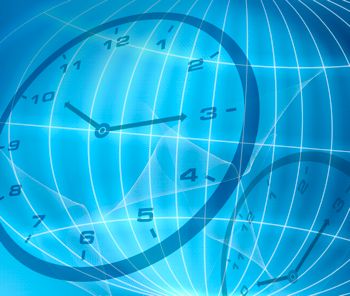A magazine where the digital world meets the real world.
On the web
- Home
- Browse by date
- Browse by topic
- Enter the maze
- Follow our blog
- Follow us on Twitter
- Resources for teachers
- Subscribe
In print
What is cs4fn?
- About us
- Contact us
- Partners
- Privacy and cookies
- Copyright and contributions
- Links to other fun sites
- Complete our questionnaire, give us feedback
Search:
A gendered timeline of technology

825 Muslim scholar Al-Khwarizmi kicks it all off with a book on algorithms - recipes on how to do computation pulling together work of Indian mathematicians. Of course back then it's people who do all the computation, as electronic computers won't exist for another millennium. More
1587 Mary, Queen of Scots loses her head because the English Queen, Elizabeth I, has a crack team of spies that are better at computer science than Mary's are. They've read the Arab mathematician Al-Kindi's book on the science of cryptography so they can read all Mary's messages. More
1818 Mary Shelley writes the first science fiction novel on artificial life, Frankenstein. More
1842 Ada Lovelace and Charles Babbage work on the analytical engine. Lovelace shows that the machine could be programmed to calculate a series of numbers called Bernoulli numbers, if Babbage can just get the machine built. He can't. It's still Babbage who gets most of the credit for the next hundred-plus years. More
1854 George Boole publishes his work on a logical system that remains obscure until the 1930s, when Claude Shannon discovers that Boolean logic can be electrically applied to create digital circuits.
1856 Statistician (and nurse) Florence Nightingale returns from the Crimean War and launches the subject of data visualisation to convince politicians that soldiers are dying in hospital because of poor sanitation. More
1912 Thomas Edison claims "woman is now centuries, ages, even epochs behind man", the year after Marie Curie wins the second of her two Nobel prizes. More
1927 Metropolis, a silent science fiction film, is released. Male scientists kidnap a woman and create a robotic version of her to trick people and destroy the world. The robotic Maria dances nude to 'mesmerise' the workers. The underlying assumptions are bleak: women with power should be replaced with docile robots, bodies are more important than brains, and working class men are at the whim of beautiful gyrating women. Could the future be more offensive? More
1943 Thomas Watson, the CEO of IBM, announces that he thinks: "there is a world market for maybe 5 computers". It's hard to believe just how wrong he was!
1945 Grace Murray Hopper and her associates are hard at work on an early computer called Mark I when a moth causes the circuit to malfunction. Hopper (later made an admiral) refers to this as 'debugging' the circuit. She tapes the bug to her logbook. After this, computer malfunctions are referred to as 'bugs'. Her achievements didn't stop there: she develops the first compiler and one of the pioneering programming languages. More
1946 The Electronic Numerical Integrator and Computer is the world's first general purpose electronic computer. The main six programmers, all highly skilled mathematicians, were women. They were seen to be more capable programmers because it was considered too repetitive for men and as a result it was labelled 'sub-professional' work. Once more men realised that it was interesting and fun, programming was re- classed as 'professional', the salaries became higher, and men become dominant in the field.
1949 A Popular Mechanics magazine article predicts that the computers of the future might weigh as little as 1.5 tonnes each. That's 11,023 iPods!
1967 The original series of TV show Star Trek includes an episode where mad ruler Harry Mudd runs a planet full of identical female androids who are 'fully functional' at physical pleasure to tend to his whims. But that's not the end of the pleasure bots in this timeline...
1972 Karen Sparck Jones publishes a paper describing a new way to pick out the most important documents when doing searches. Twenty years later, once the web is up and running, the idea comes of age. It's now used by most search engines to rank their results. More
1972 Ira Levin's book 'The Stepford Wives' is published. A group of suburban husbands kill their successful wives and create look- alike robots to serve as docile housewives. It's made into a film in 1975. Sounds like those men were feeling a bit threatened.
1979 The US Department of Defense introduces a new programming language called Ada after Ada Lovelace. More
1982 The film Blade Runner is released. Both men and women are robots but oddly there are no male robots modelled as 'basic pleasure units'. Can't you guys think of anything else?
1984 Technology anthropologist Lucy Suchman draws on social sciences research to overturn the current computer science thinking on how best to design interactive gadgets that are easy to use. She goes on to win the Benjamin Franklin Medal, one of the oldest and most prestigious science awards in the world.
1985 In the film Weird Science, two teenage supergeeks hack into the government's mainframe and instead of using their knowledge and skills to do something really cool...they create the perfect woman. Yawn. Not again.
1995 Angelina Jolie stars as the hacker Acid Burn in the film Hackers, proving once and for all that women can play the part of the technologically competent in films.
2004 A new version of The Stepford Wives is released starring Nicole Kidman. It flops at the box office and is panned by reviewers. Finally! Lets hope they don't attempt to remake this movie again.
2005 The president of Harvard University, Lawrence Summers, says that women have less "innate" or "natural" ability than men in science. This ridiculous remark causes uproar and Summers leaves his position in the wake of a no-confidence vote from Harvard faculty.

2006 Fran Allen is the first woman to win the Turing Award, which is considered the Nobel Prize of computer science, for work dating back to the 1950s. Allen says that she hopes that her award gives more "opportunities for women in science, computing and engineering". More
2006 Torchwood's technical expert (it is the organisation protecting the Earth from alien invasion in the BBC's cult TV series) is not only a woman but also a quiet, highly intelligent computer genius. Fiction catches up with reality at last.
2008 Barbara Liskov wins the Turing Award for her work in the design of programming languages and object-oriented programming. This happens 40 years after she becomes the first woman in the US to be awarded a PhD in computer science. More
2009 Wendy Hall is made a Dame Commander of the British Empire for her pioneering work on hypermedia and web science. More


